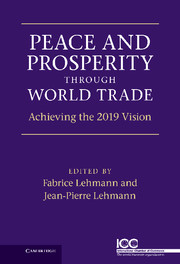Book contents
- Frontmatter
- Contents
- Notes on contributors
- Foreword
- Preface: the ICC vision
- Historical overview and dynamics
- Editorial note
- A Global systemic transformations
- B Governance of global trade
- C Poverty and global inequities
- Editorial introduction
- C1 Trade and poverty: an old debate rekindled
- C2 Trade policy as an instrument of social justice
- C3 Trade, employment and global responsibilities
- C4 Misconceptions about the WTO, trade, development and aid
- C5 Two hundred years after Jefferson
- C6 Trade, coercive forces and national governance
- C7 Gender equality in trade
- C8 Trading health for comfort
- C9 Unlocking entrepreneurial potential
- C10 Trade and security: a vital link to sustainable development in a troubled world
- D The long view on interlocking crises
- E Global business responsibilities
- Conclusion: the imperative of inclusive global growth
- Index
C2 - Trade policy as an instrument of social justice
Published online by Cambridge University Press: 05 July 2011
- Frontmatter
- Contents
- Notes on contributors
- Foreword
- Preface: the ICC vision
- Historical overview and dynamics
- Editorial note
- A Global systemic transformations
- B Governance of global trade
- C Poverty and global inequities
- Editorial introduction
- C1 Trade and poverty: an old debate rekindled
- C2 Trade policy as an instrument of social justice
- C3 Trade, employment and global responsibilities
- C4 Misconceptions about the WTO, trade, development and aid
- C5 Two hundred years after Jefferson
- C6 Trade, coercive forces and national governance
- C7 Gender equality in trade
- C8 Trading health for comfort
- C9 Unlocking entrepreneurial potential
- C10 Trade and security: a vital link to sustainable development in a troubled world
- D The long view on interlocking crises
- E Global business responsibilities
- Conclusion: the imperative of inclusive global growth
- Index
Summary
Trade is an important instrument, not a goal in itself. More trade will not necessarily result in expanded national income or poverty reduction – this is a function of the whole set of the economic, social and political conditions that influence development. This article will highlight some of the issues to be addressed if trade policy is to be an important instrument of social justice.
Trade and poverty reduction
For developing countries, one of the most important aspects of social justice is poverty reduction. Trade can play a role in poverty reduction. On average trade constitutes 30 per cent of global GDP. Poverty reduction requires sustained economic growth, which in the context of trade generally denotes export expansion. Import bottlenecks hamper the full utilization and efficient development of domestic productive capacities. Hence, exports and imports facilitate sustained economic growth, development of productive capacities, expansion of employment opportunities and sustained livelihoods.
Three types of trade-poverty relationships can be identified:
1. Virtuous trade effects, where backward and forward linkages to traded products are established leading to an overall increase in consumption.
2. Immiserizing trade effects, where few linkages are established with domestic industry, and domestic consumption actually decreases.
3. Ambiguous trade effects showing no clear trend.
- Type
- Chapter
- Information
- Peace and Prosperity through World TradeAchieving the 2019 Vision, pp. 133 - 137Publisher: Cambridge University PressPrint publication year: 2010

